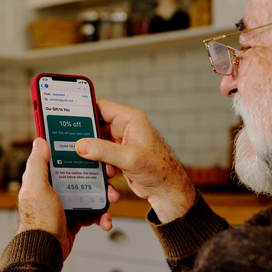Table of contents
Many Americans want to improve their health, and fitness centers are an essential part of their plans. In 2021, more than 20% of Americans belonged to a health club or studio, representing 66.5 million consumers and growth of nearly 4% over the last two years, according to The Global Health and Fitness Association (IHRSA).
If you own a gym, this is excellent news. According to Wellness Creative, one gym member is worth an average of $517 each year, and that doesn’t include customers who attend one-off classes. If you grow your membership, you can get a more significant piece of the pie. Here are six things you can do to expand your business.
1. Improve your online presence.
Before they come through your door, prospective members will visit your website and social media profiles. Make sure your online presence makes a great first impression.
Create a website connected to your booking platform, such as Square Appointments, that includes the basic information a prospective customer wants: hours, offerings, class schedule, and location. Use video content to connect with viewers in virtual gym tours, demonstrations, and a chance to “meet” you. Add a blog to share fitness and nutrition tips. You’ll provide value, establish your expertise in the field, and optimize your website for searches.
Transparent pricing is important, too. If you offer single classes, packages, and memberships, consider adding your fees to your website. That way a potential customer won’t have to call to inquire and can stop by to sign up if your offerings fit their budget.
2. Make the most of social media platforms.
While your website serves as an online hub for your business, social media is a tool that lets potential customers connect with you and your other customers directly. Choose platforms that your target customers frequent most. For example, if your customers skew younger, you might want to focus on Instagram and TikTok, while older generations spend more time on Facebook, according to a 2021 Pew Research Study.
Whichever platform you select, maintain an active and encouraging presence by posting regular content that positions you and your gym as an authority in your market. Social media can give prospective customers a deeper look into your business than your website alone can provide.
Customer testimonials and reviews are powerful. Ninety-five percent of consumers read reviews, and 86% considered them an essential resource when making purchase decisions, according to Power Reviews. Make it easy for your members to leave feedback on your social media platforms. Encourage your existing customers to share their success stories. And don’t forget to claim your pages on review sites like Yelp. According to Harvard Business Review, every one-star increase that a business gets on Yelp results in a 5%–9% increase in revenue.
3. Identify and promote your niche.
Specialization helps you stand out. By pinpointing your unique selling proposition (USP), you can find ways to target your market. An excellent way to start is to understand your customer demographics and how they currently use your programs. Then create a persona of your ideal customer, and make sure all your marketing materials target them specifically. For example, you may cater to new moms or working professionals. How you would communicate to each of these groups will vary in tone and language.
Another way to hone your niche is to study your competition and determine how you’re different. For example, you may have the top trainers, the latest equipment, or a unique class. Once you identify what a customer can only get from you, you can highlight your strengths in your marketing outreach.
4. Personalize the selling experience.
On average, marketers see a 20% increase in sales when they use personalization, according to Instapage. Instead of having a one-size-fits-all approach to membership sales, personalize the member’s experience by getting to know your prospect and their goals. Match your offerings and classes to their specific needs.
Remarket to your former customers, lapsed customers, missed guests, and web leads across all digital channels. When possible, deliver unique content to each segmented audience for increased personalization.
While it’s natural to be excited about your business and what you can offer, be careful not to become pushy. Follow up on leads, keeping all touchpoints positive and engaging. You want your prospective member to know you genuinely care about their health and fitness journey and aren’t just trying to sell a membership.
5. Ask for referrals from current members.
A happy existing customer is your best form of marketing. According to Nielsen, 92% of consumers trust referrals from people they know. And referred customers have a 37% higher retention rate, according to Deloitte.
Invite your current members to bring a friend to a free class. Make it enticing by offering a referral bonus to existing members who recruit new members. For example, you can offer a discount on membership or a free class. You could also provide swag, such as a free t-shirt or a water bottle, to serve as a gift that will become advertising as your member uses or wears it.
6. Keep things fresh.
Finally, keep things interesting by updating your classes and offerings. Check out your competitors and their class offerings. Ask your members if there are any fitness trends they’d like to try. Then do a test run to see if the new option is a hit with your audience. Consider offering online classes in addition to in-person classes. Some of your customers may prefer an opportunity to work out at home.
If you have the space, you can also add new services. For example, lease out a section of your facility to a local chiropractor or masseuse. Your members may appreciate having added health options in one place. You can also offer members permanent lockers or laundry services. This service might be a fit if you cater to the professional crowd that wants to exercise before work and not worry about keeping their gym clothing during the day.
Whatever adjustments you make, ensure that you don’t disrupt your most popular offering for the sake of change.
![]()










